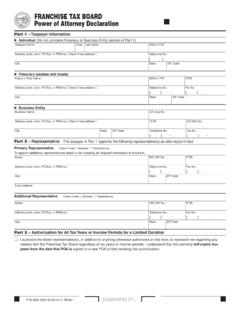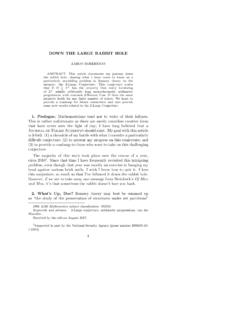Transcription of Down the Rabbit’s Hole: Baby Monitors, Family Movies and ...
1 \\server05\productn\M\MAT\23-1\ : 111-JUN-1013:21 Vol. 23, 2010 down the rabbit s Hole131 down the rabbit s hole : BabyMonitors, Family Movies and WiretapLawbyElisabeth Pride Your client is in the middle of a heated divorce, and a pri-mary issue is the custody of his nine-year-old daughter andseven-year-old son. Historically well-adjusted, in recent monthsthe daughter has shown dismaying behavioral changes. Hergrades have fallen precipitously and she has been disrupting theclassroom. She has been acting out at home as well, includingfrequent violent and prolonged tantrums without obvious expla-nation. Your client has eavesdropped on the children over ababy monitor for insight into his daughter s behavior, and,alarmed by comments he believes suggest sexual abuse of hisdaughter by the child s mother s new fianc e, has surreptitiouslyvideotaped interactions of the children.
2 He would like to pro-vide the recordings to a psychologist, and has asked you to try tointroduce the recordings into evidence at do you advise your client?Under the Supremacy Clause of the Constitution, statesare precluded from adopting eavesdropping statutes that are lessrestrictive in allowing interceptions of communications than thefederal wiretap statute; thus state wiretap statutes may bebroader and more restrictive than the federal statute and less re-strictive in no Under the federal wiretap law, Title IIIof the Omnibus Crime Control and Safe Streets Act of 1968( the Act ),2 there is no violation where the interception is by aparty to the communication or one party consents to Whilemost state wiretapping laws generally track the federal Act, con- Elisabeth Pride has practiced Family law since joining the Pittsburghlaw firm of Wilder & Mahood in Commonwealth v.
3 Birdseye, 670 1124, 1126 (Pa. 1996), certdenied, 518 1019 (1996).218 2510-13, 2515-22 (2006).3Id. 2511(2)(c)-(d).\\server05\productn\M\MAT \23-1\ : 211-JUN-1013:21132 Journal of the American Academy of Matrimonial Lawyerssent standards The first question is whether your clienthas violated the federal Act and the possible consequencesthereof. Because state statutes may be more but not less restric-tive, whether a state wiretap law has been violated may be a dif-ferent, and vastly more difficult, follows is a technical review and critique of the wire-tap laws as taken to the limits of their potential in the context ofparental While the law was never intended for thepurpose of punishing parents for monitoring their children, his-tory is full of examples of zealous prosecution under laws writtenfor another purpose but nevertheless applicable by their techni-cal language to the matter at hand.
4 Consider, for example, pros-ecution for child pornography of children sending suggestivephotographs of themselves to other children,6 prosecution under4 Thirty-eight states and the District of Columbia follow the federal Actin requiring consent of only one participant in a communication to exempt in-terception thereof. Twelve states require consent of all participants, and therest lack relevant laws, have conflicting laws, or have laws that vary in standardsfor different types of Washington. Reporters Comm. forFreedom of the Press, Can We Tape? : A Practical Guide to Taping PhoneCalls and In-Person Conversations in the 50 States and (2008), available (last visited April 8, 2010).5 Courts have expressly found that the Act applies to domestic relationscases.
5 See, , Glazner v. Glazner, 347 1212, 1216 (11th Cir. 2003). Thisarticle does not attempt to survey state and federal courts for individual exam-ples of criminal or civil cases at the extremes of application of the law as de-scribed herein. Numerous commentators have explored the practicalapplication of the Act by , , Daniel R. Dinger, Should Parents BeAllowed to Record a Child s Telephone Conversations When They Believe theChild Is in Danger?: An Examination of the Federal Wiretap Statute and theDoctrine of Vicarious Consent in the Context of a Criminal Prosecution, 28 SE-ATTLE U. L. REV. 955 (2005); Shana K. Rahavy, The Federal Wiretap Act: ThePermissible Scope of Eavesdropping in the Family Home, 2 J.
6 HIGH TECH. L. 87(2003); Parental Wiretapping: Should Federal Courts Provide a Civil Remedy ina Family Law Matter?, 48 U. KAN. L. REV. 397 (2000); Richard C. Turkington,Protection for Invasions of Conversational and Communication Privacy by Elec-tronic Surveillance in Family , Marriage, and Domestic Disputes Under Federaland State Wiretap and Store Communications Acts and the Common Law Pri-vacy Intrusion Tort, 82 NEB. L. REV. 693, 707-13 (2004).6 See, , Miller v. Skumanick, 605 F. Supp. 2d 634, 637 ( Pa. 2009)aff d sub nom. Miller v. Mitchell, 598 139 (3d Cir. 2010) (granting tempo-rary injunction against district attorney from prosecuting a minor on charges ofchild pornography for sexting ).\\server05\productn\M\MAT\23-1\ : 311-JUN-1013:21 Vol.
7 23, 2010 down the rabbit s Hole133 RICO7 laws of political protesters,8 and application of statutoryrape laws to punish teenagers for sexual activity with partners ofsimilar Judicious prosecutorial discretion cannot be reliedupon to insulate your client from criminal Amongother things, prosecutors may be motivated by political concerns,personal bias, or limited Therefore, advice toyour client about the range of possible consequences of his inter-ception must begin with an assessment whether the law has beentechnically Reading the LawUnder the law of statutory construction, resort may be madeto legislative history for illumination of a statute s intent onlywhere the words of the statute are Accordingly, thefirst step to understanding the consequences of your client s ac-tions are a close reading of the plain language of the the relevant provisions of the Federal Wiretap Act, aperson is guilty of a violation who:(a) intentionally intercepts, endeavors to intercept, or procures anyother person to intercept or endeavor to intercept, any wire, oral, orelectronic communication.
8 (b) intentionally uses, endeavors to use, or procures any other personto use or endeavor to use any electronic, mechanical, or other deviceto intercept any oral communication when ..(ii) such device transmits communications by radio, or interfereswith the transmission of such communication; or7 See The Racketeer Influenced and Corrupt Organizations Act (RICO),18 1961, was enacted to fight organized Daniel B. Kelly, Defining Extortion: RICO, Hobbs, and StatutoryInterpretation in Scheidler v. National Organization for Women, Inc., 123 S. (2003), 26 HARV. & PUB. POL Y953 (2003).9 See, , Humphrey v. Wilson, 652 501, 502 (Ga. 2007) (over-turning ten year sentence of seventeen-year-old convicted of having oral sexwith fifteen-year-old).
9 10 See v. Stevens, - ( ,2010); No. 08-769, 2010 WL1540082, at *13 (declining to overlook overbreadth of statute on assurances ofgovernment to use it responsibly ).11 See, , Robert P. Mosteller, The Duke Lacrosse Case, Innocence, andFalse Identifications: A Fundamental Failure to Do Justice, 76 FORDHAM 1337 (2007).12 See, , United States v. Gonzales, 520 1, 6 (1997), (citing Con-necticut Nat. Bank v. Germain, 503 249, 254 (1992)).\\server05\productn\M\MAT\23-1\ : 411-JUN-1013:21134 Journal of the American Academy of Matrimonial Lawyers(iii) such person knows, or has reason to know, that such deviceor any component thereof has been sent through the mail or trans-ported in interstate or foreign commerce.
10 (c) intentionally discloses, or endeavors to disclose, to any other per-son the contents of any wire, oral, or electronic communication, know-ing or having reason to know that the information was obtainedthrough the interception of a wire, oral, or electronic communicationin violation of this subsection; [or](d) intentionally uses, or endeavors to use, the contents of any wire,oral, or electronic communication, knowing or having reason to knowthat the information was obtained through the interception of a wire,oral, or electronic communication in violation of this subsection ..13 Oral communication is defined by the Act as any oralcommunication uttered by a person exhibiting an expectationthat such communication is not subject to interception under cir-cumstances justifying such expectation.










